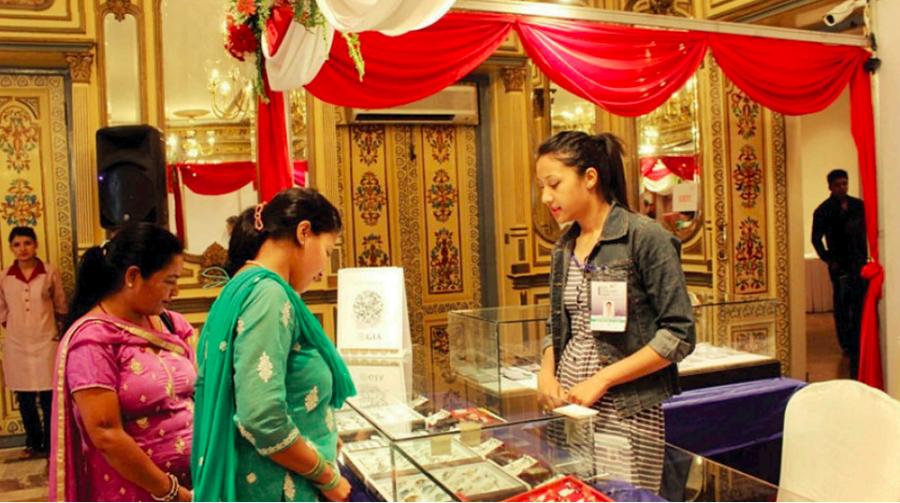National
Bullion traders asked to record details of customers who buy items over Rs1 million in a day
The directive is aimed at making the business transparent and discouraging money laundering, officials say.
Prithvi Man Shrestha
Bullion traders now need to record the identity of customers who buy precious metals and stones worth more than Rs1 million in a day from them.
The move, aimed at making trade transparent and discourage money laundering comes two years after the Inland Revenue Department was named the regulator of the bullion sector.
The department plans to implement the directive for a few bullion traders only, initially. "Our initial target is 400-500 bullion traders (wholesalers and distributors) and commercial banks," said Gopi Koirala, director at the department. "We don’t have the capacity to make all bullion traders comply."
As per the anti-money laundering law, traders can be subject to a penalty of upto Rs10 million for failing to abide by the directive.
Although the Money Laundering Prevention Act categorises bullion traders as reporting entities that need to record details of customers who buy precious metals worth over Rs1 million in addition to reporting suspicious transactions to designated authorities, they had not been doing so.
The government’s recent National Risk Assessment Report has also said there is “Medium” risk of money launderers using the bullion market.
“Dealers in precious metals and stones operate with minimum regulations, and are often unaware of their AML/CFT obligations,” the report said.
According to the report, prepared ahead of the planned evaluation of Nepal’s performance against money laundering and terrorism financing by Asia Pacific Group on Money laundering, fraudulent and smuggling activities were also found in the sector.
The new directive also requires bullion traders to maintain updated records on customers who occupy high profile positions, also known as “politically exposed persons” (PEPs). Transactions by PEPs are considered risky because they may indulge in corrupt activities by misusing their positions.
“Bullion traders need to ensure that the PEPs and their family members are properly identified and this needs to be confirmed by obtaining documents from credible sources,” the directive says.
As per Money Laundering Prevention Act, politically exposed persons range from rural municipality vice-chairpersons to the president and senior bureaucrats.
“A trader of precious metals needs to develop a risk management system to identify politically exposed persons and also make effort to find the source of funds,” the directive reads.
It says that such enhanced due diligence should also be implemented in the case of those who are found involved in suspicious transactions such as those who purchase precious metals on a large scale and unusual ways. The new directive requires that if someone buys precious metals on the behalf of others, a bullion trader needs to identify the real customer.
However, traders of precious metals and stones say that it would be difficult for them to identify politically exposed persons. “We can seek the identity documents of persons who buy precious metals above Rs1 million in a day. But, it is really difficult to identify politically exposed persons,” said Ramesh Maharjan, president of Nepal Gold Silver Gem and Jewellery Associations, a grouping of bullion traders.
He said that it would be impractical to seek identity details as doing so might discourage people from buying precious metals.
But, Koirala said PEPs can be identified even with a copy of their identity cards.
“We can identify them through our tax examination process of the bullion traders and by making the bullion traders make entry of purchases and sales in an electronic system,” he said.
As per the directive, bullion traders will have to submit a report about any transactions above Rs1 million by a customer in a day to the Financial Information Unit within 15 days of such a transaction.
In the case of suspicious transactions, the bullion trader concerned should submit a report about it to the FIU within three days. While submitting such a report, the bullion trader should submit the report in a format prescribed in the directive.
According to an official at the central bank, bullion traders hardly report their transactions to the FIU. "But, bullion traders who purchase gold from commercial banks report to the concerned bank about whom they sold the gold to and the commercial bank reports it to the central bank," said the official. As per the government's directive, only commercial banks are allowed to import gold for commercial purposes.
In order to properly implement the system, a bullion trader needs to appoint a managerial level contact person. The proprietor and staff of the firm involved in bullion trading needs to provide necessary information to such a contact person.
But, gold traders said that it would be risky to appoint someone from outside the family. "We are in the business of high value products and giving information to a person from outside about everything could be risky for us," said Maharjan.




 9.7°C Kathmandu
9.7°C Kathmandu














